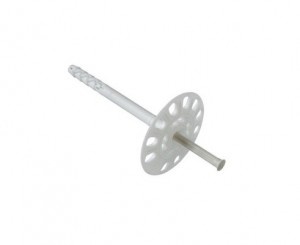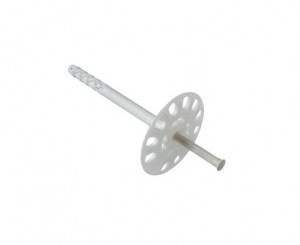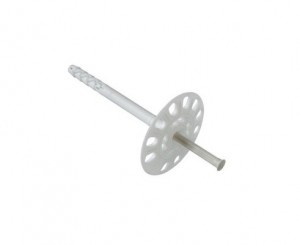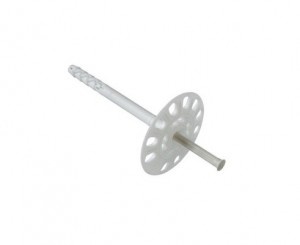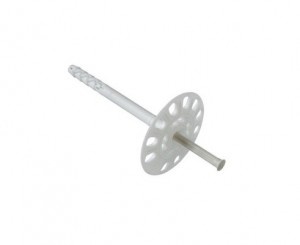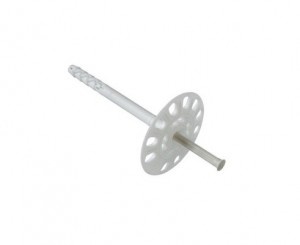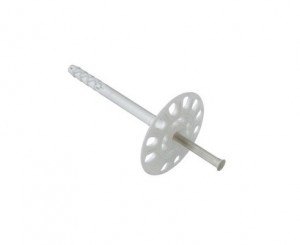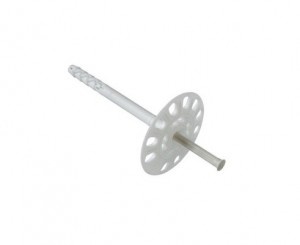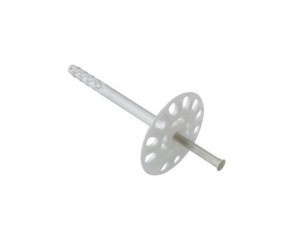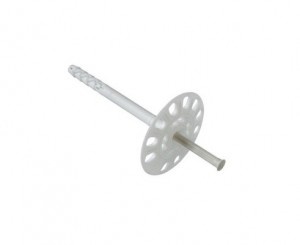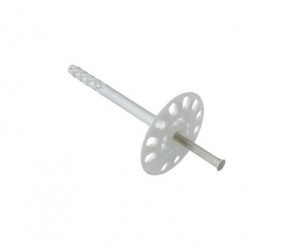Description
POLYSTYRENE DOWEL 140MM
A 140mm polystyrene dowel is a fastener used in External Thermal Insulation Composite Systems (ETICS) or interior insulation applications and is designed for mechanically anchoring expanded polystyrene (EPS), extruded polystyrene (XPS) or, rarely, mineral wool to substrates such as concrete, solid brick, hollow brick, BCA or other building materials. This dowel is designed to provide a stable fixing, resisting minor external forces such as wind or thermal variations and is ideal for extremely thin insulation thicknesses. Compared to 160 mm, 180 mm, 200 mm, 220 mm, 240 mm, 260 mm or 300 mm dowels, the 140 mm dowel is an economical solution for projects with minimal thermal requirements or specific applications.
Detailed description
1. Composition and materials
- Main body: Made of high quality polypropylene (PP) or polyethylene (PE), sometimes fibre-reinforced to increase mechanical strength. The plastic material is chosen to minimise thermal bridges, reducing heat loss and contributing to energy efficiency.
- Fixing nails: Available in galvanised steel for corrosion resistance and solid anchoring, or reinforced plastic for less demanding applications. Metal nails are preferred for hard substrates, and heat-capped designs reduce heat transfer through the nail.
- Flange (rosette): The upper part of the dowel, with a standard diameter of 60-65 mm, which presses the polystyrene board against the substrate surface. The flange evenly distributes the pressure to prevent damage to the insulating material.
- Expansion Area: Located at the bottom, this area expands into the backing material to ensure a firm hold. Some designs include multiple expansion zones, effective in porous or hollow materials such as cavity brick.
2. Dimensions and technical specifications
- Overall length: 140 mm, suitable for polystyrene boards with thicknesses of 1-8 cm, taking into account the adhesive layer (5-10 mm) and minimal or no additional layers (e.g. no old plaster).
- Diameter: The dowel body is typically 10 mm in diameter, compatible with standard drill bits.
- Anchoring depth: Minimum 50 mm into the substrate material (concrete, brick, etc.) according to pull-out strength standards. The drilled hole must be 10 mm deeper than the anchorage length for correct fixing.
- Pull-out strength: Depends on the substrate; e.g. can exceed 1 kN in concrete, but is lower in BCA or hollow brick, where specialised designs may be required.
3. Uses and applications
The 140 mm dowel is mainly used for:
- Fixing thin thermal insulation boards in façade systems with minimal thermal requirements, cosmetic refurbishment or internal insulation.
- Various substrates: concrete, solid brick, hollow brick, BCA, porous concrete or rarely wood/OSB (with suitable screws).
- Low-rise buildings (under 25 m according to local regulations), where 4-6 dowels per square metre are recommended, according to the technical design.
- Interior applications: Ideal for thin insulation in spaces such as garages, basements, annexes or unheated rooms.
- Plinth area: For extruded polystyrene used at the plinth, the cutting starts at least 30 cm above the ground to avoid contact with moisture.
- Special Projects: Used in regions with very mild climates where additional thermal insulation is minimal, or for fixing thin insulating layers in non-standard applications.
4. Advantages
- Thermal efficiency: The plastic material reduces thermal bridges, contributing to better thermal insulation, even at low thicknesses.
- Mechanical strength: Provides adequate stability for applications with minimal mechanical stress.
- Versatility: Compatible with most substrates and thin insulation types.
- Quick installation: Easily installed with a rotary hammer for drilling and a hammer for hammering the nail, without complex tools.
- Durability: Resistant to corrosion (galvanised nails) and degradation caused by moisture or chemicals.
- Maximum Economy: The short length makes the dowel extremely affordable for projects with limited budgets or low thermal requirements.
5. Installation instructions
- Surface preparation: The polystyrene boards are glued with special adhesive and left to harden (24-48 hours).
- Drilling: Use a 10 mm drill bit to create a hole through the polystyrene and a minimum of 50 mm in the substrate. The hole should be 10 mm deeper than the anchor length.
- Inserting the dowel: Insert the body of the dowel until the flange touches the surface of the polystyrene sheet.
- Fastening the nail: Tap the nail (metal or plastic) with a hammer or screw it in until the flange presses firmly against the plate without deforming it.
- Covering: Cover the flanges with reinforcing mesh and decorative plaster for exterior facades or with suitable finishes for interior applications.
6. Recommendations and standards
- Number of dowels: Minimum 4-6 dowels/sq.m for buildings under 25 m, as required by project.
- Calculation length: Thickness of polystyrene + thickness of existing adhesive/tense + minimum 50 mm for anchorage.
- Certifications: Opt for European Technical Approval (ETA) dowels to meet building standards.
- Correct installation: Avoid excessive tapping, which can damage the polystyrene board, or insufficient drilling, which reduces strength.
7. Special features of the 140 mm dowel
- Optimum for extremely thin thicknesses of insulation (1-8 cm), common in interior insulation, cosmetic renovations, outbuildings, garages or buildings in warm climates where thermal insulation requirements are minimal.
- The 140 mm length is suitable for substrates with no additional layers (e.g. clean walls without old plaster).
- Some models include depth markings or simplified design for quick installation.
8. Limitations and precautions
- Brittle substrates: In very porous or weak materials (e.g. porous BCA, old brick), pullout resistance may be reduced, requiring specialised tests or dowels.
- Incorrect assembly: Too wide a hole or insufficient anchoring compromises fixing.
- Compatibility: The very short length makes it unsuitable for thicker insulation or extra layered substrates, requiring careful checking of overall thickness.
- Thermal requirements: The thickness of insulation supported by this dowel is often insufficient for modern buildings that require high energy efficiency by today's standards.
9. Comparison with dowels of 160 mm, 180 mm, 200 mm, 220 mm, 240 mm, 260 mm and 300 mm
- Length: The 140 mm dowel is shorter than140 mm is shorter than 160 mm (by 20 mm), 180 mm (by 40 mm), 200 mm (by 60 mm), 220 mm (by 80 mm), 240 mm (by 100 mm), 260 mm (by 120 mm) and 300 mm (by 160 mm), and is suitable for insulation thicknesses of 1-8 cm, compared to 2-10 cm (160 mm), 4-12 cm (180 mm), 6-14 cm (200 mm), 8-16 cm (220 mm), 10-18 cm (240 mm), 12-20 cm (260 mm) or 15-25 cm (300 mm).
- Use: Ideal for extremely thin insulation such as minor renovations, interior insulation, garages, basements or buildings in very hot climates where thermal insulation is minimal.
- Strength: Similar performance, provided the minimum anchorage depth (50 mm) is respected. 140 mm is preferred for applications with minimal thermal and mechanical requirements.
Conclusion
The 140 mm polystyrene dowel is an extremely economical and practical solution for fixing thin thermal insulation boards in facade systems or interior applications, ideal for insulation thicknesses of 1-8 cm. With a design that minimises thermal bridging and provides adequate mechanical strength for low stress applications, this dowel is perfect for cosmetic renovations, interior insulation, outbuildings, annexes, garages or buildings in mild climate zones. Choosing a certified design and following the installation instructions are essential to ensure the durability and performance of the thermal insulation system.
Contact
Call now for any questions or to order:
+40769088858
+40769088860
+40769088861
+40769088862
Delivery
Delivery of orders
The ordered products are delivered using the delivery method and term chosen by you when placing your order. Products are in the original, sealed packaging of the manufacturer and are insured throughout the transport until delivery.
Deliveries are made by PDET's own vans and by specialised cargo courier companies.
Deliveries are from Monday to Friday between 08:00 - 17:00. For deliveries outside these hours, please contact the sales agent.
Offer
You want a lower price, you can't find what you are looking for, ask for an offer by email to: vanzari@pdet.ro





